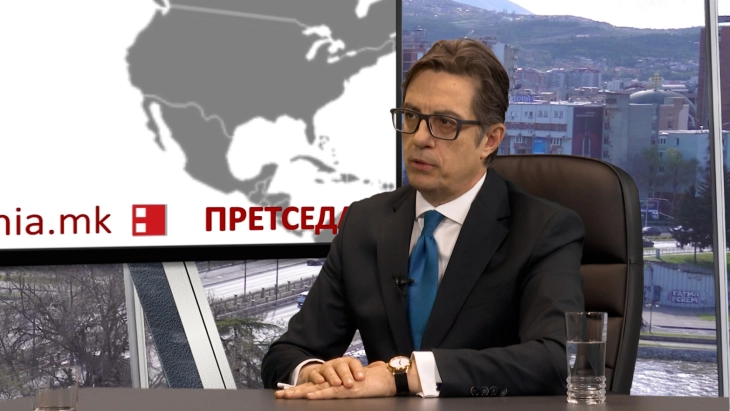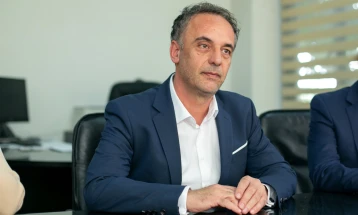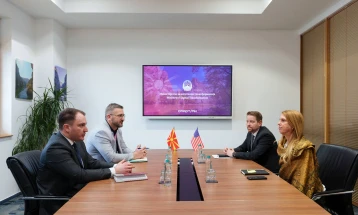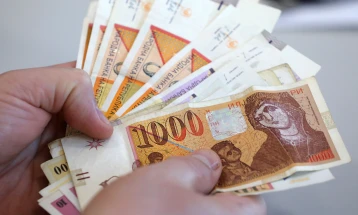Real polls show citizens’ satisfaction with presidential office over the past five years, Pendarovski tells MIA
- The incumbent president Stevo Pendarovski, who is running for another five-year term in the upcoming presidential elections, says in an interview with MIA that his first term was spotless and believes that the majority of citizens recognize this. He is running in the elections, as he notes, not just to be part of the race, but to emerge victorious and this assertion is based on the reactions he has received from citizens, not ‘based on the polls, as Mr. Mickoski mentions.’ He states that real polls show that the majority of Macedonian citizens are satisfied with the presidential office’s performance over the past five years.
- Post By Silvana Kocovska
- 10:18, 9 April, 2024

Skopje, 9 April 2024 (MIA) – The incumbent president Stevo Pendarovski, who is running for another five-year term in the upcoming presidential elections, says in an interview with MIA that his first term was spotless and believes that the majority of citizens recognize this. He is running in the elections, as he notes, not just to be part of the race, but to emerge victorious and this assertion is based on the reactions he has received from citizens, not ‘based on the polls, as Mr. Mickoski mentions.’ He states that real polls show that the majority of Macedonian citizens are satisfied with the presidential office’s performance over the past five years.
The latest developments in regard to the allegations from the party who is supporting him, SDSM, which accuses VMRO-DPMNE of commissioning and spreading fake polls on party ratings and politicians, manipulating citizens and abusing the media, and VMRO-DPMNE has responded that will file a lawsuit, Pendarovski commented on these as the first signs of nervousness from the leader of the main opposition party.
In response to VMRO-DPMNE’s allegations of document forgery involving Kovachevski and Pendarovski, along with Israeli media strategist Asaf Eisin, Pendаrovski stated that he has no knowledge of the document in question, nor has he participated in any such activity, nor does it occur to him to do so. Regarding the Israeli individual, he says he has seen him only once in his life and has no agreement with him.
“I'm aware that it has been released, but I'm uncertain about the authenticity of that document. I do not know. I haven’t been involved in such activities, nor do I even consider doing it. What I do know is regarding the polls, and they reveal a stark contrast with the stance, situation, and figures presented by the main opposition party to the Macedonian public. Therefore, their position, both as a party in parliamentary elections and that of their presidential candidate, is far from favorable. And probably, these incredible constructions, which I believe a rational person in a healthy state of mind wouldn't be able to create or even desire, are owed to that. So, the Israeli expert they mention, I've only seen him once in my life as part of the many PR experts working in that field, offering their services. He came, went, whom he had agreements with previously, I don't know. With whom he'll have agreements from today onwards, I don't know. However, I want to make it clear that I have no agreement with him whatsoever. Throughout my term, funds from the presidential budget will not be used for polls, propaganda, or payments to any experts. So, I have never entered into any agreement with that individual, nor do I have any intention of doing so or providing money under the table. That's just not how I operate. However, I'm not certain whether the main opposition party, particularly during the 2020 elections, didn't engage in such practices with the same individual,” Pendаrovski stressed.
He believes that the differences between the top two candidates who will enter the second round will be minimal. As for whose votes he expects to gain if he enters the second round, he emphasizes that he does not believe in the concept of vote transfer.
“I have never had faith in such practices. So, even if you have the best intentions to give me your votes from the first round or vice versa, I don't believe it can be done because over the 33-34 years as an independent state, I believe Macedonian citizens have matured in that regard. I even think that 99 percent of them, if approached in such a manner, would consider it an insult. They know very well whom they would vote for or would simply abstain,” Pendаrovski said.
Regarding how he will convince citizens that he is the right choice, he notes that his political profile has been known for many years, and he believes that rarely has anyone in the history of Macedonian politics been completely transparent in what they have done.
“Hardly a day passes without citizens visiting my office or me going out somewhere, often in front of cameras, to engage with people. Frankly, I believe there's no need to further persuade anyone by saying, 'But you don't know me, let me tell you something else.' I feel I've said all there is to say. Over the past five years, I've reiterated this at numerous citizen gatherings - yesterday, the day before, having travelled 80 thousand kilometers across Macedonia. So, I haven't been confined to my office. Instead, I've gone to see citizens where they work, create, and live, including those in dire social conditions and those who are more affluent, both young and old, and everyone in between. I genuinely don't feel the need to persuade anyone further because you have all the facts in front of you. You have all the facts, whether in favor or against, or to remain passive; that's your democratic right,” Pendаrovski stated.
Regarding the presidential function and based on his five-year experience, and whether he believes any modifications are necessary, Pendаrovski takes the stance that the role of the president, as outlined in the Constitution, is well-balanced in relation to other essential institutions, particularly in relation to the government.

“Firstly, it is indisputable that the president, in a political sense, is weaker in terms of authority and real political power compared to the government. Undoubtedly, the Prime Minister is a stronger political figure regardless of their name, regardless of the name of the president. However, there is an overlap in several vital sectors, such as foreign policy, defence, and security, where as the president, if you know how to do so and use it, allows your voice to be heard. Ultimately, in the final product, whether it's a law or a personnel decision, you also have some level of participation, be it smaller or larger. So, it's not entirely accurate that the president is merely the one who approves what the government proposes, and in terms of ambassadors and other positions in the defence and security sectors,” Pendаrovski stated.
In regard to the requests from Albanian parties for the head of state to be elected in the Parliament, the head of the state, Pendаrovski, states that he disagrees with that stance. He argues that the president, with his current responsibilities arising from direct election by the citizens, possesses much greater moral authority or support, Pendаrovski said.
Regarding the perception that presidents are often seen as an extended arm of the supporting party, he responds that it's an illusion if anyone believes that only purely independent candidates win even in the largest democracies in the world, regardless of established and traditional political parties. He underscores that support from one of the major parties is necessary, but also from the civil sector, individuals, people not affiliated with any political party.
"So, I don't believe we should abolish or set them aside just because we're talking about a president who should represent all citizens. Whether they will continue to play a role depends on the individual. Regardless of who elected you and voted for you, how independent you will be in relation to them. I insist on that, and I've demonstrated it with concrete acts - I've returned several laws, vetoed laws passed by the parliamentary majority that supported me, and now supports me after five years. So, I don't think that's a handicap. I believe it just requires a well-positioned president, a clear concept, and vision for what is good for the citizens, not just for the parties. The suspensive veto gives you that right and privilege, at least the suspensive veto gives you that right and privilege,” Pendarovski says.
However, he did not exercise that right to veto the changes to the Criminal Code, which again triggered reactions in the public and led to expiration of a large number of cases, most of which were opened by the former Special Prosecutor’s Office. Some called these changes a silent amnesty. And why didn’t he use the veto right in this case, Pendarovski says the information they had from the Parliament was that there was certainly a silent consent from the opposition and that precisely the opposition achieved the quorum. He adds that both the government and the opposition agreed that such a thing should be adopted.
In response to the remarks that these amendments have led to the expiration of many cases, and hope in the fight against corruption has been lost, Pendаrovski stated that his main argument was that cases expire because judges keep them shelved and do not want to adjudicate them.
“My main argument was that cases expire because judges keep them shelved and do not want to adjudicate them. And I provided several examples to the public. For instance, you have one outdated case, I think the case of Magyar Telekom. It took twelve and a half years to have the first-instance judgment. We had cases from the so-called Special Prosecutor's Office at the time that were in court for seven or eight years without a final judgment. And now, if you think that by giving them another seven or 77 years, those kinds of judges will conclude the case, we are all deluding ourselves. The pressure was to say, 'Here is your deadline,' and whoever hides that or does not want to act means that either they are corrupt or heavily pressured by the center, whether it's economic or political power, and they should face sanctions. Such judges should no longer be judges. That was the goal, the idea that was the rationale. Otherwise, no case becomes outdated in just two or three months; they simply didn't get a chance because the parliamentary majority didn't give them a chance. There is no case that has become outdated that dates back to at least 2015 or 2016. The Special Prosecutor's Office (SJO) was established in September 2015, and since then, all these big high-profile cases known to the public have started. Imagine, it's 2023 now, and here comes 2024, eight years, nine years, and none of that has been convicted, no one is in prison, and those who should be are mocking the system; it's practically not a prison,” Pendаrovski says.
In reference to his proposal for vetting judges, public prosecutors, as well as all politicians from the 90s to the present day, and whether it is fair or merely pre-election rhetoric, he states that legal experts offer modalities. Legal amendments need to be enacted, but he stresses that this vetting does not imply automatic imprisonment for the politician; rather, it signifies their disqualification from political involvement. He also brought up the law on restrictive measures, linked to the US blacklist, which failed to garner support from the Parliament.
In regard to the EU integrations, the unimplemented constitutional amendments, the lack of a secured two-thirds majority, and the well-known stances of political parties, Pendarovski states that this task remains with the next Parliament and the next government because it is there where the necessary constitutional changes would potentially need to be adopted.
"You know that my position on this matter is well-known, that two years ago, the current opposition had no interest in doing it solely due to partisan interests. They took the nationalist rhetoric to the extreme, started frightening the people with Bulgarian proposals, dictates, claiming that we would only enter the EU by becoming Bulgarians, which is utter nonsense. However, they scored some points with that, boosted their slightly sagging ratings, and stubbornly held onto that narrative until the very last day. If they eventually come to power tomorrow, they will have to explain to the citizens why two years ago they organized protests, engaged in unprecedented political propaganda, and employed a harsh nationalist rhetoric, primarily scaring the Macedonian people that they wouldn't be Macedonians anymore with that alleged French proposal under the alleged Bulgarian dictate,” Pendarovski noted.
Regarding Macedonian-Bulgarian relations, the recent indirect accusations from the Bulgarian Ministry of Foreign Affairs that he spreads hate speech and the idea that if he gets a second term he would attempt to improve relations, considering the current rhetoric, he says it takes two to tango.
“Indeed. You know, as the saying goes, it takes two to tango. In the past three years, Bulgaria made an incredible strategic mistake first towards the Macedonian people, and later towards our entire state. So, you simply cannot expect to create space for better bilateral relations with rhetoric from the 19th century. Their behavior was non-European, undemocratic, end of story. If they continue like this, now I see they are already scheduling new elections, we don't know who will be next in those elections. If they continue with the same rhetoric, the same policy towards us, they cannot expect us to say, “Alright, we agree with everything you demand," because 99 percent of Bulgaria's demands are nebulous, 99 percent of their demands are heavy nationalism. One percent concerns the Bulgarians in the Constitution, which I don't think is a particularly problematic situation, a stumbling block preventing us from having the seven nations and parts of nations we have in the Constitution,” Pendarovski says.
He underscores that the strategy is clear and concerns what we can offer, but he also emphasizes that it will relate to the present, to human rights, to democracy, and history should remain in the history textbooks.
“We objectively offered in all those discussions and negotiations with Brussels because it became clear early on with the Bulgarians that direct bilateral agreements were not feasible. You can see how the historical commission didn't work, they attempted from a position of strength to impose their historical narratives, which was unacceptable. There has been no progress there in the last two years. Our stance is clear. We will continue in the same manner, using arguments and discussing European principles, not the 19th century, not the San Stefano Bulgaria, not some uprising from who knows when. Let's now see what the problem is. This means we can only discuss from the standpoint of human freedoms and rights concerning the small Bulgarian minority living here and from the perspective of the overall level of democracy in Macedonia. This is how one becomes or does not become a member of the European Union. It's not about whether someone said this or that in the 19th or 18th century. Those are issues that should remain in the history textbooks,” Pendarovski stresses.
According to his knowledge, and commenting on the statement of the US Ambassador Angela Aggeler that they will closely monitor the elections and any foreign interference, he stresses that there are currently no such indications. He says there are some minor attempts from entities that, as he puts it, are linked to malign actors associated with Russia.

“However, I must tell you that at this moment, Russian interference in our elections is much lower than it was, for example, during my first election in 2019 or the referendum in 2018, because Russia had no interest in Macedonia becoming a NATO member. So far, my assumption is that they are completely absorbed with all the resources they have in that sphere due to the invasion they made in Ukraine. Now they are trying to counter the Western narrative about their illegal war in Ukraine. They are not too focused on the Balkan region," Pendarovski underlines. Presidential candidate and incumbent head of state Stevo Pendarovski adds that these attempts may intensify as the first, and especially the second round of elections approach.
Ana Cvetkovska
Translated by Silvana Kochovska
Photo: MIA
Video and editing: Andrej Brankovikj and Vladimir Rabasovikj







